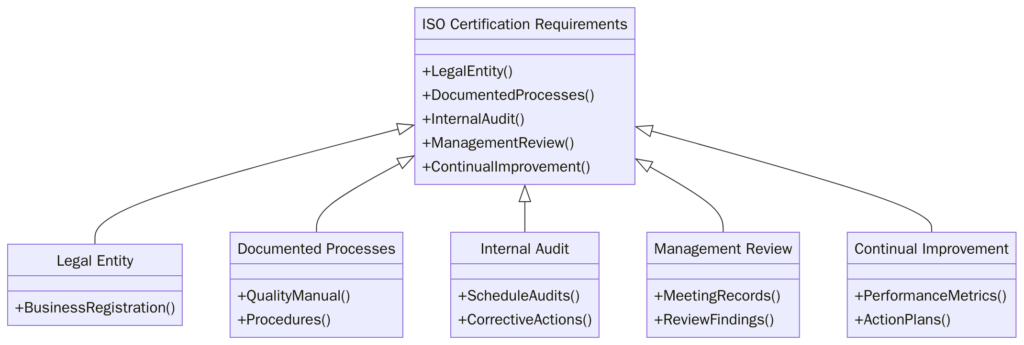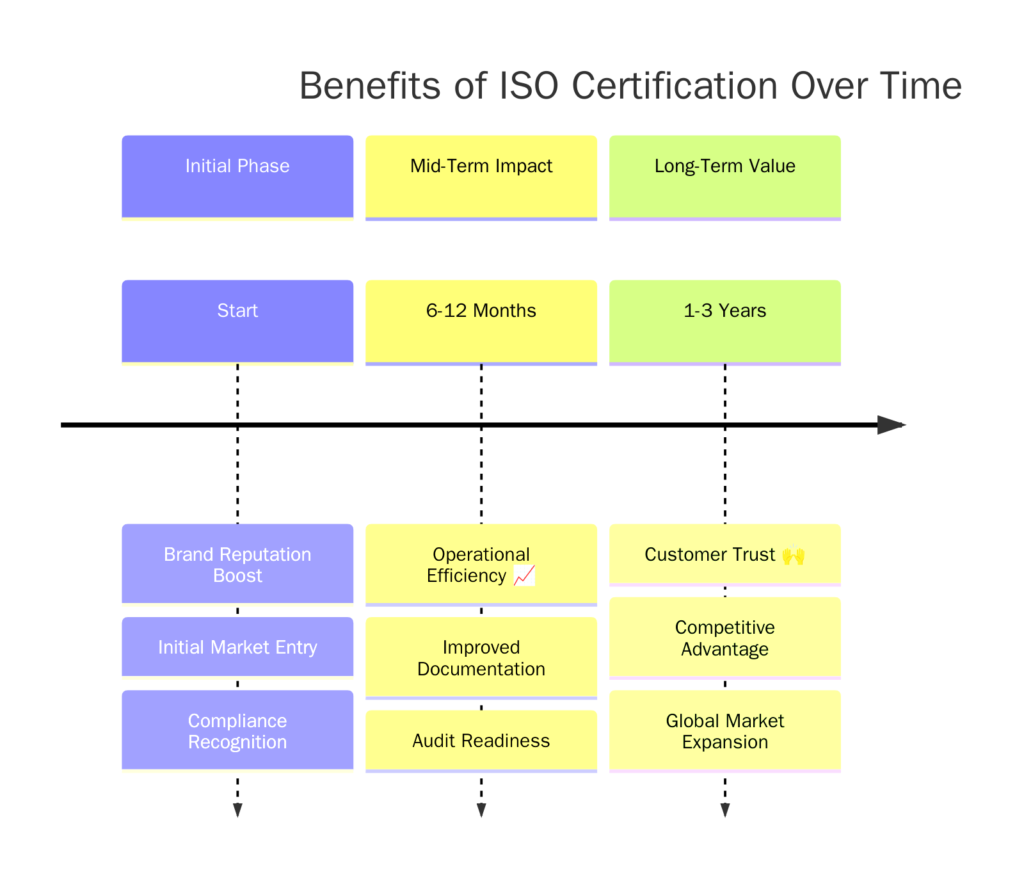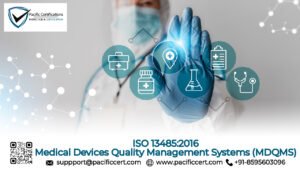Introduction
In a world driven by global trade, data protection, and sustainable practices, ISO certification has emerged as a fundamental step for U.S. businesses looking to build credibility and enhance operational integrity. Whether you’re a startup in Chicago, a healthcare provider in Houston, or a tech firm in Silicon Valley, aligning with international standards is essential!
At Pacific Certifications, we understand that achieving ISO certification is more than just ticking boxes. It’s about transforming your systems to achieve consistency, mitigate risks, and open up international market opportunities. Our role is to help organizations translate technical ISO requirements into a business advantage that aligns with your strategic goals.

What is ISO Certification and Why It’s Gaining Ground in the U.S.
The International Organization for Standardization (ISO), sets global benchmarks for quality, environmental sustainability, data security, health and safety, etc. Certification to an ISO standard indicates that an organization meets internationally recognized requirements and reliable management practices.
For American companies, ISO certification is a signal of trust. It validates your processes in the eyes of clients, regulators, partners, and investors. With increasing regulatory scrutiny in sectors like healthcare, energy, finance, and food, ISO certifications such as ISO 9001, ISO 14001, and ISO 27001 are now vital tools to operate competitively and compliantly.
The shift from reactive compliance to proactive governance is a key reason why ISO adoption is accelerating across the U.S. landscape.
Get expert guidance on your ISO certification process. Contact Pacific Certifications today at support@pacificcert.com.
Top ISO Certifications Businesses Need in 2025
Looking ahead, the following ISO certifications are expected to be particularly valuable for businesses:
- ISO 9001: Continues to be essential for quality management across industries.
- ISO 27001: Gaining importance due to increasing cybersecurity concerns.
- ISO 14001: Aligns with a growing emphasis on environmental sustainability.
- ISO 45001: Focuses on employee health and safety, a priority in the post-pandemic era.
- ISO 22000: Critical for food industry players to ensure food safety and compliance.

Why ISO 9001 Matters to U.S. Businesses
ISO 9001:2015 is the most adopted ISO standard in the world, and the U.S. is no exception. ISO 9001 is being implemented to systematize internal operations and strengthen quality assurance from manufacturing to legal services.
In a competitive economy, having ISO 9001 certification provides a foundation for consistent product and service delivery, reduced waste, and better alignment across departments. More importantly, it instills confidence among customers and supply chain partners that your operations meet rigorous global quality standards.
At Pacific Certifications, we’ve seen companies use ISO 9001 not just for operational improvements, but to unlock new revenue streams through better contract eligibility and client onboarding processes.
Local Impact, National Reach: ISO Certification in New York
New York’s economy is diverse, from financial services and software development to healthcare and logistics. As such, ISO implementation varies, but the trend is consistent: clients expect verifiable quality and data protection.
Many companies in the state are adopting ISO 27001 to meet NYDFS cybersecurity rules, while hospitals and biotech firms pursue ISO 13485 and ISO 9001 for FDA and patient care alignment. Retailers are also turning to ISO 9001 to boost supply chain efficiency and consumer satisfaction.
Local factors like state grants and regional compliance frameworks make it all the more critical to work with certification partners that understand both national and local dynamics. That’s where we, Pacific Certifications, bring our strength.
Start your ISO journey with Pacific Certifications. Request a consultation now, contact support@pacificcert.com!
The Role of ISO Certifications in U.S. Supply Chains
Supply chain resilience has become a strategic priority following global disruptions over the past few years. ISO certification—especially ISO 9001—plays a pivotal role in maintaining traceability, consistency, and supplier accountability.
Certified businesses can better monitor performance across tiers of suppliers and reduce risks of recalls, delays, or non-compliance. This is particularly important in automotive, aerospace, food, and healthcare sectors, where vendor qualification increasingly demands third-party certification.
OEMs and major buyers in the U.S. are now listing ISO certification as a prerequisite for long-term supplier relationships. Thus, ISO has become a bridge between supply chain performance and business continuity.
Startups and ISO Certifications
Contrary to popular belief, ISO certification is not just for established enterprises. For startups, it’s a way to stand out, especially when competing for enterprise clients, grants, or international partners. ISO 9001 and ISO 27001 in particular are proving to be powerful tools for early-stage companies looking to assure clients about their process maturity and data integrity.
Implementing an ISO system helps startups define operational roles, minimize risks, and create a culture of continuous improvement. At Pacific Certifications, we offer modular certification programs tailored for startups—with simplified documentation and scalable systems to grow with the business.
Exporting from the USA? Skipping ISO Certification Might Be a Dealbreaker
ISO certifications are often required by foreign buyers and regulators. They function as a universal language of quality and compliance, easing the path to enter complex or high-barrier markets.
Exporters dealing with food products (ISO 22000), medical devices (ISO 13485), and general manufacturing (ISO 9001) use certification to enhance their credibility and streamline customs or product registration processes.
In some sectors, ISO standards are harmonized with national regulations, such as CE marking for the European Union. Therefore, certification doesn’t just enhance your export readiness—it can determine your export viability.
Understanding the Costs Involved
The cost of ISO certification in the United States can vary widely based on factors such as company size, the number of sites, the complexity of processes, and the type of ISO standard. Pacific Certifications offers flexible pricing models, including bundled Integrated Management Systems (IMS) packages, and audit preparation services to ensure clients maximize ROI from their certification journey.

What’s Driving ISO Certification Growth in 2025?
Recent market data shows a surge in ISO certifications across the U.S., driven by regulatory changes, client expectations, and global supply chain complexity. Companies are no longer treating certification as a checkbox—they’re embedding ISO standards into their operational DNA.
Cybersecurity regulations are propelling ISO 27001 adoption, particularly in healthcare, financial services, and SaaS. Sustainability mandates and ESG reporting are pushing firms toward ISO 14001 and ISO 50001. Post-pandemic resilience concerns have boosted interest in ISO 22301 for business continuity planning.
A growing number of firms are also moving toward Integrated Management Systems to streamline certifications and minimize audit fatigue.
Conclusion: More Than a Certificate
ISO certifications, when implemented meaningfully, become a catalyst for business improvement, resilience, and reputation. It shows that an organization is not only capable of meeting today’s demands but is proactively preparing for tomorrow’s challenges.
At Pacific Certifications, our job is to make that transformation tangible. We help businesses—from startups to multinationals—implement standards that go beyond compliance and truly drive growth.
If you’re considering ISO certification in the United States, let’s start a conversation.
Contact Pacific Certifications
📧 support@pacificcert.com
📞 +91-8595603096
Read More at Pacific Certification Blogs
FAQs – ISO Certifications in the United States
To get ISO certified, companies should:
Select the relevant ISO standard.
Implement the necessary systems and documentation.
Undergo a third-party audit by an accredited certification body like Pacific Certifications.
Maintain compliance through periodic surveillance audits.
ISO certification verifies that a company meets international standards for quality, safety, efficiency, or security. In the U.S., it’s crucial for gaining global trust, meeting regulatory requirements, and accessing government or international contracts.
Some of the most widely adopted ISO standards in the United States include:
ISO 9001 – Quality Management
ISO 14001 – Environmental Management
ISO 27001 – Information Security
ISO 45001 – Occupational Health & Safety
ISO 13485 – Medical Devices
ISO certification is generally voluntary, but it is often required by clients, industries, or government agencies for contracts, particularly in sectors like defense, healthcare, automotive, and IT.
The timeline varies based on the company’s size, readiness, and chosen standard, but it typically takes 2 to 6 months from preparation to certification.
ISO certification is provided by accredited third-party certification bodies, not ISO itself. Trusted bodies like Pacific Certifications conduct audits and issue certificates in line with international standards.
Yes. ISO certification is valuable for small and medium-sized enterprises (SMEs) in the U.S. as it improves internal processes, builds credibility, and opens up new business opportunities.
The cost depends on the standard, company size, and complexity. Pricing typically includes audit fees, training, documentation support, and annual surveillance audits.
ISO certifications are valid for three years, with annual surveillance audits to ensure ongoing compliance.








